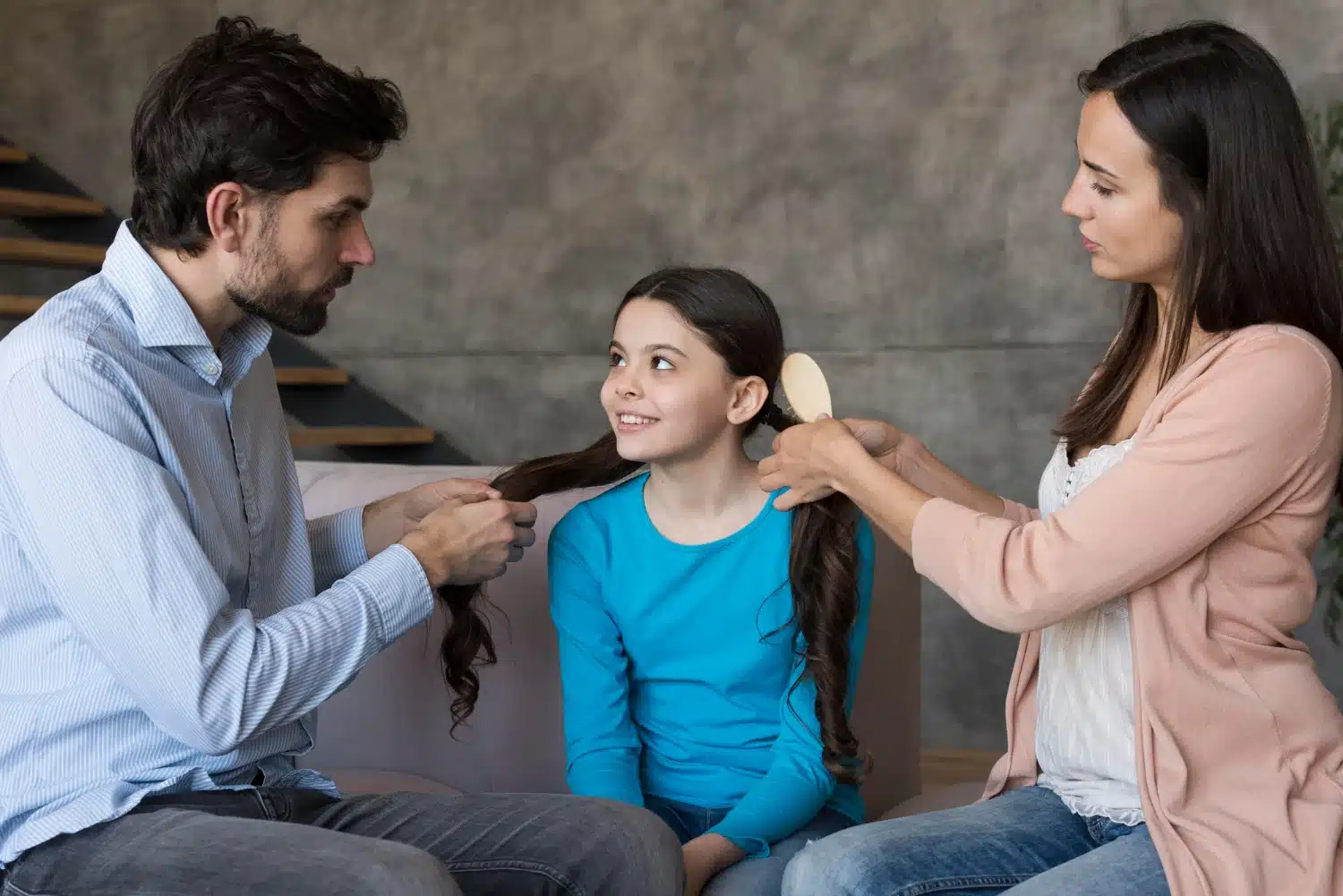Feeling overwhelmed by tantrums, power struggles, and endless reminders? “Parenting with Love and Logic” might be the approach you’ve been searching for. Developed by Jim Fay and Foster Cline, this philosophy goes beyond simply setting rules. It’s about fostering responsibility, emotional intelligence, and a strong parent-child bond.
What Are The Core Principles of Parenting with Love and Logic?
Unconditional Love and Empathy
At the heart of Love and Logic lies a foundation of love and acceptance. This doesn’t mean giving in to every whim, but rather acknowledging your child’s feelings and creating a safe space for them to express themselves. It’s about letting your child know that their emotions are valid and that you are there to support them, no matter what. This approach helps build a strong, trusting relationship between you and your child.
Setting Limits with Love
Love and Logic emphasizes clear and consistent boundaries. These limits aren’t about punishment, but about safety and teaching children the natural consequences of their choices. For example, a forgotten lunch might mean a simple sandwich from the cafeteria (not a frantic delivery from home). By setting these limits, you help your child understand that their actions have consequences, which is a crucial life lesson. It’s about guiding them to make better choices without harsh punishments.
Empowering Problem-Solving
Love and Logic encourages children to take ownership of their actions. Instead of constant nagging or rescuing, parents can offer choices and guidance to help children develop problem-solving skills. This might involve asking, “What can you do to fix this situation?” By doing this, you are teaching your child to think critically and come up with solutions on their own. This not only builds their confidence but also prepares them for future challenges.
Benefits of Love and Logic:
Raising Confident, Happy Kids (the Easy Way!)
Ever feel like you’re stuck in a loop of yelling, reminding, and cleaning up messes? You’re not alone! Parenting can be tough, but there’s a way to raise happy, responsible kids without the constant struggle. That’s where Love and Logic comes in.
Think of Love and Logic as a parenting philosophy, not a strict set of rules. It’s all about building a strong relationship with your child, where they feel loved and supported, but also learn to take responsibility for their actions. Here’s the good news: Love and Logic can actually make your life easier in the long run!
Imagine this:
Your child forgets their lunch at home. Instead of scrambling to deliver it (been there!), you might say, “Oh no, looks like you forgot your lunch. Would you like a cheese sandwich from the cafeteria, or maybe some yogurt?” This gives your child a choice, but also lets them experience the natural consequence of forgetting – a less exciting lunch.
This approach teaches your child responsibility and problem-solving skills. They learn that their choices have consequences, good or bad. This builds confidence because they start to see themselves as capable individuals who can handle challenges.
But wait, there’s more!
Love and Logic isn’t just about consequences. It’s also about building a strong bond with your child. This means showing them lots of love, even when they make mistakes. Maybe your child throws a tantrum in the grocery store. Love and Logic suggests staying calm and acknowledging their feelings (“Hey, I see you’re really upset”). This helps your child feel safe and loved, even when they’re acting out.
So, the benefits of Love and Logic boil down to three big things:
-
Confident, “Can-Do” Kids:
When children experience the results of their choices, they learn from them and become more responsible. They start to believe in themselves and their ability to tackle problems.
-
Happy Families, Strong Bonds:
Love and Logic is all about open communication and empathy. When you listen to your child’s feelings and work together to solve problems, your relationship gets stronger. This makes parenting more enjoyable for everyone!
-
Emotionally Smart Stars:
Love and Logic help children understand their emotions and how to deal with them in a healthy way. This is a valuable skill they’ll carry into their future relationships and adult life.
Love and Logic: Less Fuss, More Fun with Your Kids!
Picture this: You’re at the park, and your little one throws a meltdown because they can’t have another ice cream. Sound familiar? Parenting can feel like one battle after another. But what if there was a way to raise happy, responsible kids without the constant struggle? Love and Logic might be the answer you’ve been looking for!
Here’s the deal: Love and Logic isn’t a set of strict rules, it’s more like a parenting philosophy. It’s all about building a strong connection with your child, where they feel loved and supported, but also learn to take charge of their own actions. It might sound complicated, but trust us, it’s actually pretty easy to use!
Imagine this scenario: Your child forgets their homework at home. Instead of getting stressed and driving it back to school, you could say, “Oh snap, looks like your homework stayed home. Maybe you can talk to your teacher and see what can be done.” This allows your child to experience the natural consequence of forgetting (a chat with the teacher), while also letting them feel like they can figure things out.
This approach teaches your child responsibility and problem-solving skills. They learn that their choices have consequences, both good and bad. This builds confidence because they start to see themselves as capable people who can handle challenges, big or small.
Sure, consequences are important, but Love and Logic is more than just that. It’s also about showing your child tons of love, even when they mess up. Maybe your child throws a tantrum at the grocery store because they want a candy bar. Love and Logic suggests staying calm and acknowledging their feelings (“Wow, you seem really frustrated right now”). This helps your child feel safe and loved, even when they’re acting out.
Now, let’s talk about some common parenting battles:
-
Power Struggles:
Ever feel like you’re constantly arguing with your child? Love and Logic helps by offering choices. Maybe it’s choosing between putting on their pajamas or picking a bedtime story. This way, they feel like they have some control, which reduces those frustrating power struggles.
-
Tantrums:
We’ve all been there. Love and Logic suggests staying calm and offering empathy (“I see you’re really upset about not getting that toy”). This helps your child navigate their emotions without feeling like they need to throw a fit to get what they want.
-
Screen Time:
Screens can be a real struggle for families. Love and Logic suggests working together with your child to create a clear family technology plan. This way, everyone knows the rules and expectations, making screen time less stressful.
Love and Logic might not be a magic trick, but it’s a pretty powerful tool for raising happy, responsible, and confident kids.
Ready to give Love and Logic a try? Great! There are tons of resources available, from books like “Parenting With Love and Logic” to websites and support groups. Remember, it takes practice, but the rewards of raising happy, confident children are definitely worth it!
Here are a few suggestions:
- Books: “Parenting With Love and Logic” by Jim Fay and Foster Cline is a classic resource.
- Websites: The Love and Logic Institute website (https://www.loveandlogic.com/) offers articles, courses, and workshops.
- Support Groups: Connecting with other parents who use Love and Logic can be a great source of encouragement and advice.
Remember:
Love and Logic is a journey, not a destination. It takes practice and patience, but the rewards of raising responsible, confident, and emotionally intelligent children are well worth the effort.
More Articles on Parenting:










